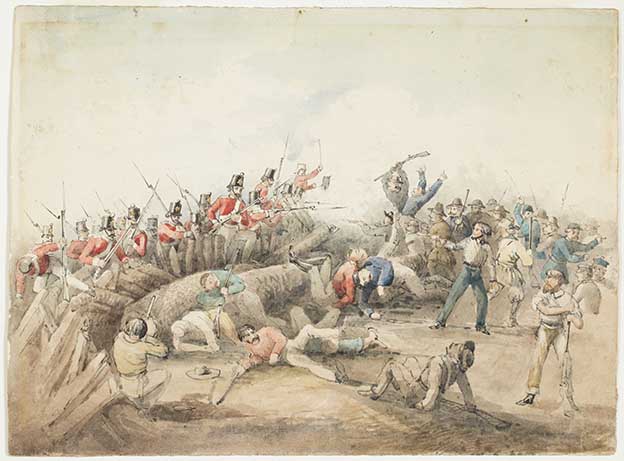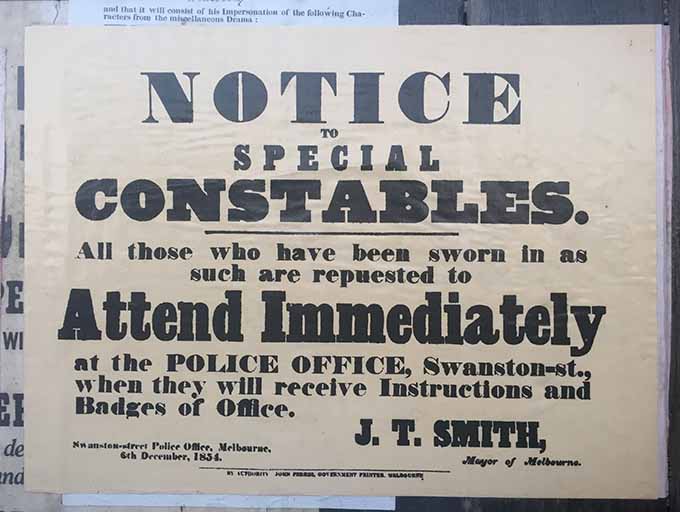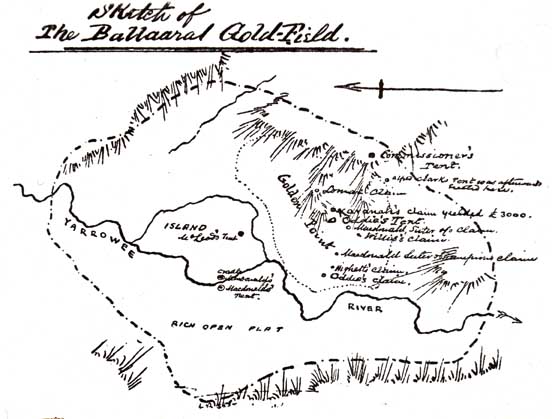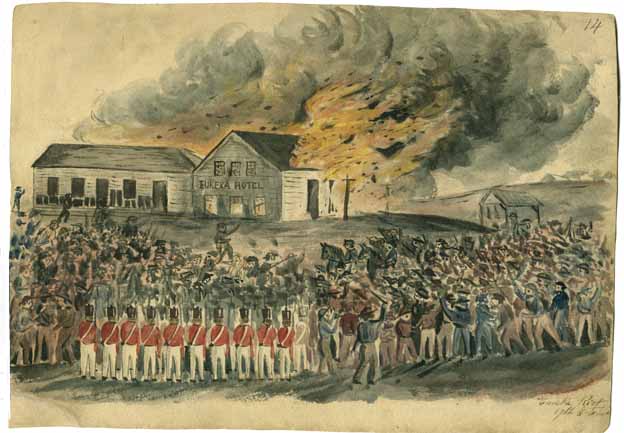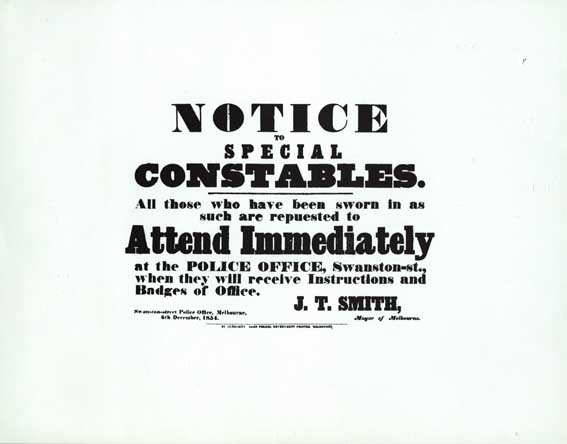Police
Contents
Police Commissioners
James Johnstone, Assistant Commissioner for Police
Goldfields Police
The police culture in 1854 was that of an armed paramilitary gendarnmerie. troopers and police were garrisoned in centralised posts, such as the Ballarat Government Camp., and not permitted to fraternise with civilians.[1]
130 military pensioners resident in Van Diemen's Land (Tasmania) were hired by the Victorian Government.[2]
By January 1853 there were 230 mounted police in the Victorian Colony. By 1845 it had risen to 485, including nine mounted detectives. [3] Police are encouraged to pocket half of the fine money for anyone caught without a license.
Police Officers and Members of the Force
John Algie - Hussey Chomley - Ladislaus Cossack
Ballarat Police
The first police camp was established at Golden Point, moving to the Camp Street location in mid-1852.
In 1854 the mounted police was led by Furnell, Chomley and Cossack.
After the Eureka Stockade battle an eyewitness, Alfred Madocks, wrote of the police:
- That hated body of men, the troopers, committed acts of most wanton barbarity, murdering inoffensive people. (They had had none of the fighting being kept as a reserve). As an instance – one man living a long way from the scene and in bed with his wife was dragged from her arms and murdered in his tent, which they afterwards fired. They thus at one blow deprived her of her husband and everything she was possessed of. Some of these Gentlemen have since been picked off – they are all spotted and vengeance is not wanting.[4]
The Star of 1861 reported that "POLICE BARRACKS.- A handsome brick building in Lydiard street. The police force on Ballarat is 1 officer, 2 mounted sergeants, 25 mounted constables, 8 sergeants, 81 foot constables, and 5 detectives". [5]
Uniforms
Soft peaked cap.
Gold Escort
Troopers
Thomas Atkins, John Badcock, William Barry, Robert Calvin, Charles Carter, Hussey Chomley, Thomas Conboy, John Concritt, Michael Costelloe, Thomas Crowther, John Culkin, Henry Downing, Gordon Evans, Robert Evans, Gartner, John Gillman, Joseph Glover, Henry Foster, George Fraser, Samuel Furnell, Henry Goodenough, John Hagherty, Gerald Hamilton, Benjamin Hawkshaw, William Kelly, Hugh King, John King, Ladislaus Kossak, James Langley, Thomas Langley, Michael Lawler, James Lord, Robert McLister, Thomas Milne, Robert Milne, Henry Moore, William Nolan, Constable Nugent, Michael O'Brien, James Pepper, Andrew Peters, Edward Preece, Robert Pulley, John Sadlier, William Scharlach, Peter Smith, Patrick Sullivan, William Thompson, Robert Tulley, Edward Viret, Wendon, A. Warren White, Michael Wigley, Thomas Wood, Henry Wright, Maurice Ximenes
Newspaper Articles
- OUR POLICE AT THE GOLDFIELDS- Any-one visiting our various diggings and inquiring into the arrangements that are made for the protection of the people, would be struck with wonder and astonishment at the inconsistency which characterises the disposition of the police.
- The lavish expenditure which may be noticed in some places, and the miserable pittance in numbers of men which is doled out in others, almost induces a belief that the heads of the Departments are not very well qualified for their posts, or what is still worse, that they are ignorant of how these things are managed. The police of this colony have been gradually getting into a state of discipline and although there may be instances of misconduct amongst them, yet upon the whole it is admitted that they are becoming an effective body. They are looked upon by the people as their natural protectors, as a check upon crime, without the aid of whom naught but murder, Rapine, and Robbery would be stalking abroad, it is , therefore, the more important that the strength of the force should be so distributed as to be brought to bear most effectively upon the districts where the population is most extensive. It is because we are desirous to see this principle carried out into practice that we propose to bring before our readers a few statistical facts that will place the past and present regulations in rather a curious light. We here tofore have thought that the extent of a police establishment was regulated by a number of the population of the district but from what has lately come to our knowledge it is not so, but upon some other principle unknown to us. At McIvor, for instance, where the population amounts to some 300 to 400 people, the police numbered, until very lately, about 100 men, including the mounted police. At the Goulburn, again, the population of which we are informed does not exceed 200, the police force amounts to 60 men. At Fryers Creek and Loddon, with a population of 4,000, they have 12 men to guard them – Whilst a Tarrangower, with a population of 20,000, the whole force does not exceed 18 when, nine of whom are constantly on duty on the camp guarding the Gold-office, etc ... [6]
- DARING ROBBERY OF THE BALLARAT BRANCH OF THE BANK OF VICTORIA - Intelligence was received in Melbourne Tuesday afternoon of the perpetration of a most daring and extensive robbery on the Bank of Victoria, Ballaarat, the thieves having succeeded in carrying away a booty of some 4-5 thousand pounds in notes, and about 230 ounces of gold. The accounts of the outrage, as yet come to hand are: About one p.m. on Monday, four disguised and armed men suddenly marched into the Bank when none, but the manager and one or two clerks were there, and one of them presenting and snapping a loaded pistol (Which luckily miss fired) at the manager, they (without resistance) took away a number of bank-notes, and five bags of gold marked ‘T. Forsyth,’ containing 68 ozs 8 dwts 12 grs, 32 ozs 19dwts, 51 ozs 7 dwts 12 grs, 57 ozs 5 dwts, and 23 ozs 6 dwts total; 233 ozs 6 dwts. The notes are all £10 ones, the numbers from 18,501 to 18,900, having all disappeared. How the robbers got away with impunity, or what they subsequently did, does not appear on the face of the reports; but it is supposed they had taken the route for Melbourne. They are thus described. ... [7]
Mount Alexander Mail 20.10.1854
- DIGGER HUNTING IN BALLARAT
- To the Editor of the ‘Geelong Advertiser and Intelligencer.’
- SIR, - Permit me to call to call your attention to the recent harsh proceedings adopted here for the recovery of the diggers’ license tax.
- Since the visit of Sir Charles Hotham, an unusual degree of severity has been exercised towards the more unfortunate of the mining population, and why, I cannot imagine, unless, as the officials here are known for neglect in theif catching, they are anxious to show their utility in digger hunting, and to endeavour to prove a case for the continuance of the office of gold commissioner.
- The digger, for some days past, have indeed been vigorously ‘patrolled’ by a large and armed military police force, with carbine, broad sword, and holster pistols, well mounted too (making allowance for the small cost), and accompanied by the additional ‘protections’ in the shape of foot police, with batons only visible. Now, a very new chum would see in this a great amount of zeal in the pursuit of the gangs of vagabonds who steal our horses, poison our dogs, and prowl around our tents at midnight to take life and property, or both; but we know the truth. It is to enjoy the now common sport of digger hunting. Almost daily these ‘armed bands,’ headed by the valiant and renowned Cornet Spriggins, parade the ground and demand if the toiling and honest creator of colonial wealth is possessed of a license. I know that a license fee must be paid - ‘The court awards it,’ but, sir, is it to be endured, in a possession of the British Crown, that an armed police force may ‘bail up,’ and require the production of your badge in all places, and at all times. And here I may, I hope, reasonably ask how you manage in town?
- We are ignorant and ‘wandering tribes,’ not much acquainted with civilised life up here. Does a military police parade your public ways, and ask if you have paid your taxes? They do not so in England. If the law were humane, just, and discriminating, we could not, we ought not to complain; and, if administered in a proper mode, it would be cheerfully borne. But poverty stretches its gaunt and withered hand on the diggings as elsewhere, however many may be apt to believe and endeavour to prove the contrary. The unlicensed digger is, in nine cases out of ten, compelled, by sheer absolute need, to be without a license, and to expose himself to the chance of being heavily fined, or imprisoned, with common felons; and if he should still continue poor, he must, for the next offence, be still more inhumanely punished. A cannot tell whose sage council...
- RIOTS AT BALLARAT - It will be in the remembrance of our readers that a man named James Scobie was brutally murdered on the 7th inst, near Bentley’s Eureka Hotel, Ballaarat. The evidence adduced at the inquest bore strongly against some of the members of Bentley’s establishment, and, in consequence, Bentley and two others were arrested on the Monday following, and admitted to bail of £1000 each. On Thursday, the 12th inst., they were examined before the police magistrate. Mr Dewes, and the commissioners, Messrs Robert Rede and Johnston. The evidence against them was pretty strong, and the general expectation was, that they would be committed. However, the decision of the magistrate was, that there was not the shadow of a case against Mr Bentley, and that he, as well as the others, were honourably discharged. The decision was received with groans and hisses, and it was evident ..... dissatisfaction existed in the ..........
.....public mind Rumours ........ ...acter of the Bench spread abroad, a.......... evident that the matter was not to be allowed to rest. A public meeting was announced to be held on Tuesday, near the spot were Scobie was murdered. It is necessary to mention that Bentley’s hotel had acquired a very bad name throughout the diggings, numerous robberies having occurred in it since its establishment; and complaints were general, that though a favorite resort for thieves and Vandemonians, the establishment seemed to be under the protection of some of the Camp authorities, as no notice was taken of its well known irregularities. This explanation will. Is some measure, account for the spirit evinced at its destruction. The business of the meeting was to commence at twelve o’clock, and long before that hour an immense number of people were on the spot. A strong body of foot-police, under Sub-Inspector Ximenes, was posted in the hotel, and the mounted troops, under Captain Evans, were stationed in the adjacent hollow. When the chair was taken, about 3000 people were present, which increased to 5000 before the termination of the meeting.
- The resolutions were as follow: -
- 1. “That this meeting, not feeling satisfied with the manner in which the proceedings connected with the death of the late James Scobie have been conducted either by the magistrate or by the coroner, pledges itself to use every lawful means to have the case brought before other and more competent authorities; and, to effect this object, do forward a petition, embodying the facts of the case, for the consideration of the Lieutenant -Governor.
- 2. “ That this meeting views with mingled feelings of indignation and surprise the address in favour of Mr Bentley which appeared in the ‘Ballarat Times’ on Saturday last, and begs to express its total dissent from the sentiments therein conveyed.
- 3. “That this meeting deems it necessary to collect subscriptions for the purpose of offering a reward for the conviction of the murderer of murderers, and defraying all other expenses connected with the prosecution of the case.”
- And here followed the petition to Sir Charles Hotham, wherein the evidence was fully set forth.
- After the meeting was over some hundreds of the vast multitude took up their quarters in front of the hotel, and began hissing and groaning, and yelling out ‘The murderer the murderer.’ In a few minutes time the first stone was thrown by a skulking boy of a drunken man, and the work of destruction commenced. In the meanwhile several of the prime movers of the meeting, and other respectable men, were seen rushing through the mob, exhorting ..........
- .......it into the flames. A dray and shay-cart were also run into the flames. It being stated that the latter did not belong to Mr James Bentley, it was at some risk rescued; but on further inquiry it was ascertained to be his property, and immediately run into the burning mass, and totally consumed.
- About three hours after the commencement of the proceedings and about two hours after the first application of fire, there remained nothing of the once only too famous Eureka Hotel but the glowing embers and the dismantled chimneys.
- When all the property of the obnoxious Bentley had been destroyed, the cool determined spirit of vengeance which had hitherto marked the proceedings gave way to drunken revelry of the rabble. The hot ashes were ransacked for bottles of ale and spirits with as much eagerness as could have been displayed on another Golden Point or Specimen Hill. There was only one man taken by the police, and he was rescued on the way to the Camp. Great excitement prevailed in the Camp last night. Several reports came, to the effect that the diggers were coming in great strength to take Mr Bentley, and there was a force under arms all night.
- The administration of justice, it is apparent, has received a severe blow in this district; and it is entirely to be attributed to the inconsistent, and, to the public, insulting decision of the Bench on Thursday last. With the evidence brought before them, and aware, moreover, of the well-known character of Mr Bentley’s establishment, to decide “that there was not the shadow of a case against him, and that he was honorably discharged,” seemed to the public so inconsistent with facts, and so contrary to justice, and to excite universal feeling of indignation, which found vent in the terrible outburst yesterday.
- A petition to his Excellency Sir Charles Hotham, requesting him to institute another investigation into the case, is about to be sent round for signature.
- The late James Scobie, whose unfortunate death has given rise to al these proceedings, was a native of Scotland, and was much respected throughout these diggings. He is said to be related to Captain Hall, who was so well known in the Chinese war, and who has lately... [8]
Special Constables
- Notice to Special Constables
- All persons sworn in as special constables during the late disturbances on the Ballaarat Gold Fields are requested to return the baton supplied to them to the Inspector of Police, Swanston Street. [9]
Sworn Special Constables
See Also
References
- ↑ Blake, Gregory, To Pierce the Tyrant's Heart,Australian Military History Publications, 2009, p.75.
- ↑ Blake, Gregory, To Pierce the Tyrant's Heart,Australian Military History Publications, 2009, p.75.
- ↑ Blake, Gregory, To Pierce the Tyrant's Heart, Australian Military History Publications, 2009, p.75.
- ↑ Anthony Fyson, Eyewitness at Eureka IN History Today Volume: 54 Issue: 12 2004.
- ↑ Star, 11 September 1861
- ↑ Mount Alexander Mail 17.06.1854
- ↑ Mount Alexander Mail 20.10.1854
- ↑ Mount Alexander Mail 27.10.1854
- ↑ Victorian Government Gazette, 17 January 1856.
